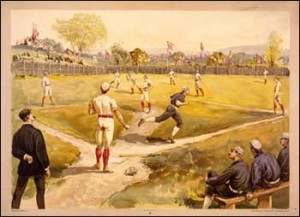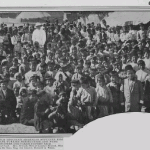 I am trying to track down the history of “Indian” team names among professional sports teams in North America. I am particularly interested in the period before 1897 when the success of major league outfielder Louis Sockalexis, the travelling Nebraska Indians baseball team, and the baseball and football teams of the Carlisle Indian School produced an equation in many American’s minds between athletic success and Native American ethnicity.
I am trying to track down the history of “Indian” team names among professional sports teams in North America. I am particularly interested in the period before 1897 when the success of major league outfielder Louis Sockalexis, the travelling Nebraska Indians baseball team, and the baseball and football teams of the Carlisle Indian School produced an equation in many American’s minds between athletic success and Native American ethnicity.
I know that many, mostly amateur, pre-1876 nines used Indian names for their clubs–I am relying upon Marshall Wright’s list of clubs in his history of baseball before 1870 for this assertion–and that most 19th-century nicknames for professional clubs were unofficial.
(The incorporation of the territorial exclusivity principle into professional baseball in 1876 made team names less necessary, since there could be only one Boston team in the National League or, for that matter, only one New Castle, Pennsylvania team in the minor-league Iron and Oil Association.)
Based upon the information on team names in the Baseball America’s Minor League Encyclopedia, 3rd ed., it appears that the practice of identifying professional baseball teams by Indian names largely began in 1887 (interestingly, during the season following the passage of the Dawes Act in February 1887). That year, one finds teams like the Oneida Indians, the Wichita Braves, the Springfield (Mo.) Indians, the Fort Smith Indians, the Scranton Indians, and the Zanesville Kickapoos.
(I don’t count the London (Ont.) Tecumsehs of the International Association of 1877 and 1878 as a team with a Native American name, because that club was named after an individual Native American who was at the time treated as a Canadian national hero. Portraits of Tecumseh in a red British general’s uniform were not uncommon in 19th-century Canada.)
It is easy to understand why Indian names would be attached to teams in towns like Oneida and Wichita since those are tribal names as well as city names. I suppose that in the 1880’s places like Springfield, Missouri and Fort Smith, Arkansas were still close enough to their frontier origins (and to Indian Territory) that people might still associate Native Americans with those communities.
However, I have no idea why a team in Scranton would be called the Indians, especially since the same team was also referred to as the Miners, which makes sense given that Scranton was so closely linked to the anthracite coal industry.
I do know that local histories of Scranton in the late 19th century emphasized that the land on which the city was situated had been purchased by William Penn from the Delaware Indians (and Scranton’s county has an Indian name, Lackawanna), but presumably similar stories could be told for most American communities. Perhaps there been an earlier, amateur club in Scranton called the “Indian Baseball Club” and the name somehow got attached to the town’s first professional team.
Most baffling is the team known as the Zanesville Kickapoos. The Kickapoo were a real tribe, but by the 1880’s they had long been relocated to the west. Moreover, their Midwestern base had been in western Indiana, not eastern Ohio, and there is, as far as I can tell, no reason to associate them with Zanesville. Maybe it was a hidden reference to the team’s penchant for “kicking” (complaining), or possibly local sportswriters thought the name sounded funny and thus adopted it. But that is just a guess.
Rosters for the 1887 Scranton and Zanesville teams can be found in the Baseball-Reference.com database, but none of the players on those teams have obviously Native American names.
On a related note, one of the truly bizarre team names in the history of minor league baseball is the Terre Haute Hottentots. (Hottentot is a European-coined term for certain native tribal groups in southwestern Africa, and its usage is almost always viewed as derogatory.)
The name became associated with the Terre Haute team when it returned to the professional ranks in the early 1890’s. It was apparently used to describe all of Terre Haute’s entries in various mid-western leagues until 1910 when the team name was changed to “Stags.” However, the Hottentot name was revived in 1921 as “Tots” and was used continuously until the Terre Haute franchise went out of business after the 1937 season.
I can find nothing that discusses the origins of the name, or how it came to be attached to the Terre Haute team. However, my suspicion is that it refers in a good-humored, racist way to the Terre Haute team’s previous employment of noted black baseball players Bud Fowler and Moses Fleetwood Walker. Fowler played with the team in 1888, and Walker, a former major-league catcher, participated in the 1890 pre-season, but apparently did not play in any regular season games.
Moreover, “Hottentot” sounds a little bit like “Haute and Terra” and there is a certain alliterative quality to “Terre Haute Hottentots.” Such things may have passed for humor in late 19th-century Indiana.
Comments on any of this would be much appreciated.
 I was recently summoned to serve as a juror in Jefferson County, Wisconsin. As a 3L about to graduate, I have had some recent exposure in my classes and internships to the jury selection process. Being on the other side of the process, being in the pool of potential jurors, gave me some unique insights into the process that I think I may not have ever had otherwise. I took many notes during the course of my time in the pool of potential jurors, and I will share a number of these observations in my blog entries during the month of December. For myself, perhaps the most interesting thing I observed is how the experiences jurors have on the day of jury duty, before entering the courtroom, influence their moods or attitudes once they are in the courtroom.
I was recently summoned to serve as a juror in Jefferson County, Wisconsin. As a 3L about to graduate, I have had some recent exposure in my classes and internships to the jury selection process. Being on the other side of the process, being in the pool of potential jurors, gave me some unique insights into the process that I think I may not have ever had otherwise. I took many notes during the course of my time in the pool of potential jurors, and I will share a number of these observations in my blog entries during the month of December. For myself, perhaps the most interesting thing I observed is how the experiences jurors have on the day of jury duty, before entering the courtroom, influence their moods or attitudes once they are in the courtroom.

